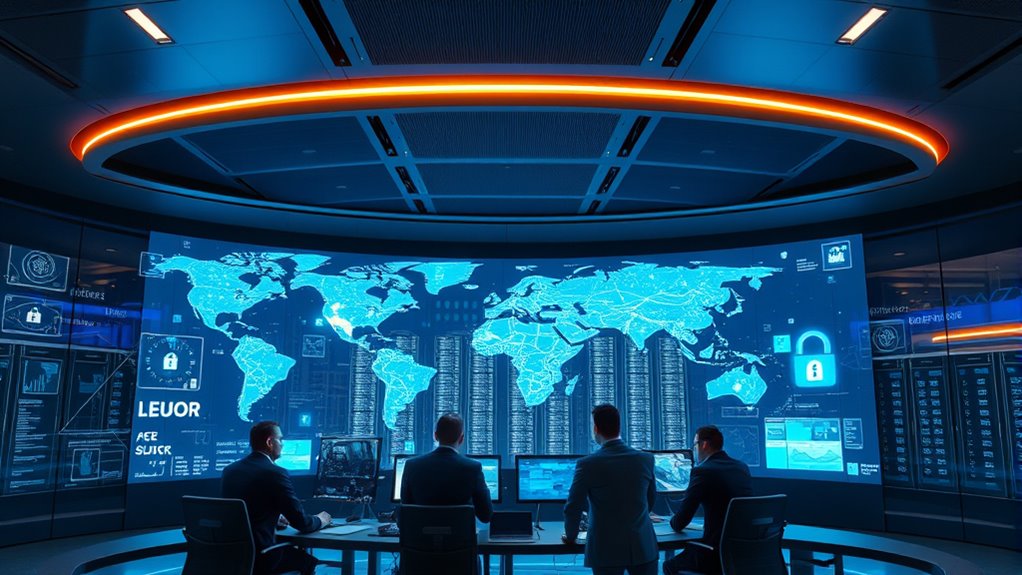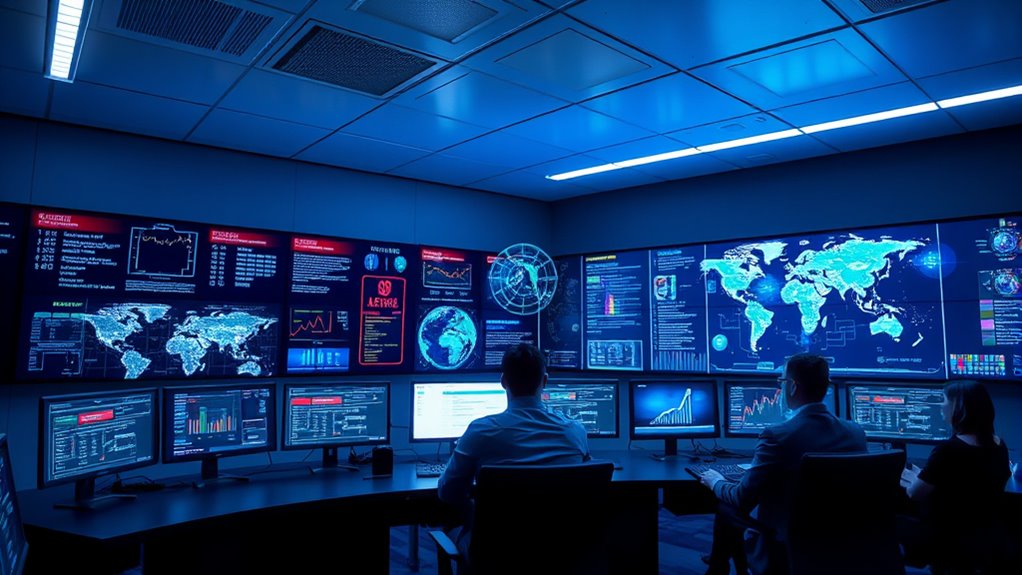EU INTCEN unites Europe’s intelligence efforts by enabling real-time information sharing among member states to combat cyber threats and terrorism. They establish secure protocols, facilitate collaboration, and promote trust to quickly respond to emerging high-tech threats. By coordinating cybersecurity strategies and protecting critical infrastructure, INTCEN helps Europe stay resilient in a digital age. If you keep exploring, you’ll discover how this essential agency keeps Europe safe amid rapid technological changes.
Key Takeaways
- INTCEN coordinates intelligence efforts among EU member states for rapid threat detection and response.
- It implements secure protocols for information sharing while protecting sensitive data.
- INTCEN facilitates real-time cooperation and asset sharing to counter cyber threats effectively.
- It promotes trust among nations through secure and timely intelligence exchanges.
- INTCEN leverages collective intelligence to adapt to technological advancements and emerging threats.

EU INTCEN, the European Union Intelligence and Situation Centre, plays a essential role in coordinating intelligence efforts among member states to guarantee collective security. It acts as the nerve center for gathering, analyzing, and sharing critical information across the EU. Given the rapidly evolving landscape of threats—cyberattacks, terrorism, and hybrid warfare—INTCEN enables you to understand and respond swiftly to emerging risks. One of its core functions is to foster cybersecurity cooperation among member states. In today’s high-tech world, cyber threats don’t respect borders, so effective cooperation is fundamental. INTCEN helps facilitate joint efforts to defend critical infrastructure, protect sensitive data, and counter cybercriminal networks. It ensures that teams across countries are aligned, sharing insights and best practices to strengthen defenses against cyber intrusions.
INTCEN coordinates EU member states to combat cyber threats through vital intelligence sharing and cybersecurity cooperation.
A key element of this collaboration is the implementation of robust intelligence sharing protocols. These protocols define how information flows between national agencies and EU institutions, allowing you to access timely, relevant intelligence. They set standards for data security, classification, and dissemination, ensuring that sensitive information is protected while remaining accessible to those who need it. By adhering to these protocols, member states can exchange intelligence efficiently, reducing delays that might otherwise hinder rapid response. INTCEN’s role is to oversee and refine these protocols continuously, adapting to new threats and technological developments. This coordination helps prevent gaps that adversaries might exploit, ensuring a unified front across the continent. Asset division also plays a crucial role in enhancing operational cooperation among member states, enabling more effective responses to security challenges. Additionally, maintaining information security is vital for building trust and ensuring the integrity of shared intelligence.
You may not see the complex network behind the scenes, but it’s working tirelessly to guarantee your safety. When a cyberattack strikes or a new threat emerges, INTCEN’s coordination enables swift information exchange, so member states can respond cohesively. This system also promotes trust among nations, as shared intelligence fosters a sense of collective responsibility. Furthermore, the intelligence sharing protocols are designed to balance openness with security, giving you confidence that sensitive data remains protected while enabling effective cooperation. INTCEN’s efforts have helped establish a more resilient cybersecurity environment, where member states aren’t working in isolation but as part of a united front.
In a world where technology advances at lightning speed, INTCEN’s role in facilitating cybersecurity cooperation and maintaining strong intelligence sharing protocols is essential. It ensures that Europe stays ahead of threats, leveraging collective intelligence to defend its citizens and infrastructure. Your safety depends on this seamless coordination, and INTCEN is the backbone that keeps the EU’s security architecture resilient and responsive.
Frequently Asked Questions
How Does EU INTCEN Ensure Data Privacy and Security?
You can trust that EU INTCEN guarantees data privacy and security by implementing strong privacy frameworks and data encryption methods. They follow strict regulations to protect sensitive information, making sure that data remains confidential and secure during sharing and analysis. By continuously updating security protocols and adhering to privacy standards, they prevent unauthorized access and safeguard your data in a high-tech world.
What Are the Main Challenges in International Intelligence Sharing?
Think of international intelligence sharing as a delicate dance—you must stay in sync despite trust barriers and legal complexities. These obstacles can create chasms between nations, making collaboration difficult. Differences in legal frameworks, privacy concerns, and trust issues hinder seamless information exchange. Overcoming these barriers requires building mutual confidence and harmonizing laws, so you can share essential intelligence effectively and protect shared security interests in a rapidly evolving, high-tech world.
How Does EU INTCEN Adapt to Emerging Cyber Threats?
You need to understand how EU INTCEN adapts to emerging cyber threats by focusing on cyber threat mitigation and digital evidence handling. They stay ahead by developing advanced techniques to detect and respond to cyber attacks swiftly. This includes sharing real-time intelligence across member states and refining procedures for handling digital evidence securely. These efforts ensure Europe enhances its resilience against evolving cyber risks, safeguarding critical infrastructure and national security.
What Role Does Artificial Intelligence Play in Intelligence Analysis?
Artificial intelligence markedly impacts intelligence analysis by enabling you to process vast amounts of data quickly and accurately. Machine learning algorithms help identify patterns and anomalies that might otherwise go unnoticed. Data analytics powered by AI allows you to make more informed decisions, enhance threat detection, and streamline information sharing. As a result, AI tools become essential in staying ahead of emerging security challenges in today’s fast-paced, high-tech environment.
How Does EU INTCEN Coordinate With Non-Eu Intelligence Agencies?
You’re wondering how EU INTCEN coordinates with non-EU intelligence agencies. It does so through bilateral agreements and participation in international intelligence alliances. These collaborations facilitate information sharing, ensuring timely and accurate intelligence. By building trust and establishing clear protocols, EU INTCEN enhances its global network, allowing Europe to stay ahead of emerging threats and work seamlessly with partners outside the EU.
Conclusion
You see, EU INTCEN’s role in sharing intelligence keeps Europe safer in a tech-driven world. Imagine a cyberattack on critical infrastructure; through swift intelligence sharing, EU agencies could coordinate a rapid response, preventing disaster. This collaboration exemplifies how Europe’s intelligence network adapts to new threats, ensuring collective security. By embracing innovative technology and seamless communication, you help maintain stability and protect citizens from emerging dangers in an increasingly interconnected world.









